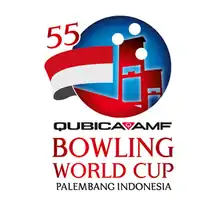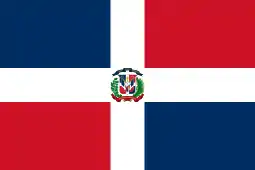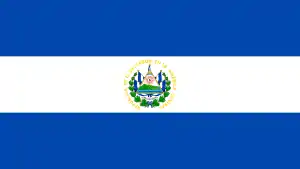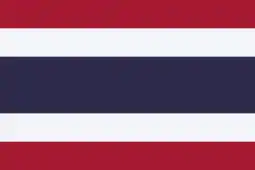QubicaAMF Bowling World Cup
The QubicaAMF Bowling World Cup, previously known as the International Masters and AMF Bowling World Cup, is an annual Ten-pin bowling championship sponsored by QubicaAMF Worldwide, and the largest in bowling in terms of number of participating nations. Each nation chooses one male and/or one female bowler to represent them in the tournament, and in the majority of cases, this is done by running a qualifying tournament, the winners of which (male and/or female) are chosen.
 | |
| Tournament information | |
|---|---|
| Sport | Ten-Pin Bowling |
| Location | 2019: Jakabaring Sport City, Palembang, Indonesia |
| Dates | 2019: November 16–24 |
| Established | 1965 |
| Administrator(s) | QubicaAMF Worldwide |
| Format | See format section |
| Participants | 133 bowlers from 75 countries; 73 men and 60 women[1] |
| Website | QubicaAMF Bowling World Cup |
| Current champion | |
| Men 2019: Women 2019: | |
History
The Bowling World Cup was created by AMF's European Promotions Director at the time, Victor Kalman, and Gordon Caie, AMF's Promotions Manager in the UK at the time.[3] Dublin, Ireland in 1965 hosted the first-ever Bowling World Cup, then called the International Masters. 20 bowlers, all men, participated. Lauri Ajanto became the first-ever winner of the BWC. Women first competed in 1972, the 8th edition of the AMF Bowling World Cup in Hamburg, West Germany where Irma Urrea became the first-ever woman to win the BWC.
13 countries have participated in every Bowling World Cup since its inception: Australia, Belgium, England (as Great Britain from 1965 to 1995), Finland, France, Germany, Ireland, Italy, Mexico, Netherlands, Norway, Switzerland and United States.[4]
As of 2019, the Bowling World Cup has visited 42 different cities in 31 different countries.
Currently the men's champion is Francois Louw and the women's champion is Rebecca Whiting.[2] On March 9, 2020, World Bowling and QubicaAMF announced a merger of the World Bowling Singles Championships and the QubicaAMF Bowling World Cup into one annual event, that will continue to be called the QubicaAMF Bowling World Cup from 2020 onwards.[5] The 56th QubicaAMF Bowling World Cup will be held in Salmiya, Kuwait at the Kuwait Bowling Sporting Club.[2] This will be the first time Kuwait hosts the Bowling World Cup.
Format
Qualifying Rounds
- Stage 1: Qualifying Round of 24 Games, total pinfall. Top 24 Men, Top 24 Women advance to Stage 2, total pinfall carries over.[6]
- Stage 2: Top 24 Men, Top 24 women bowls 8 games. Top 8 Men, Top 8 Women based on total pinfall after 32 games advance to Stage 3.[6]
- Stage 3: Top 8 Men, Top 8 women bowls another 8 games in a round robin format, 30 bonus pins for a win, 15 bonus pins for a tie. Top 4 Men, Top 4 Women after 40 games (total pinfall + bonus pins) advance to the knockout finals.[6]
Knockout Finals
- Semifinals: First seeded bowler vs Fourth seeded bowler; Second seeded bowler vs Third seeded bowler, winners (Men and women) advance to the finals.[6]
- Finals: Semifinal winners bowl for the title. (Men and women)[6]
Lane Pattern
For the 2019 BWC, all games are bowled on one pattern, typically a 41 foot pattern unless lane topography at the host site dictates that the pattern be adjusted one foot less or one foot more.[7]
Previous winners
Source:[8]
Number of titles by country/territory
|
| |||||||||||||||||||||||||||||||||||||||||||||||||||||||||||||||||||||||||||||||||||||||||||||||||||||||||||||
- As West Germany.
Records
Winners
 Paeng Nepomuceno holds two Guinness World Records from his victories in the QubicaAMF Bowling World Cup. His four victories (1976, 1980, 1992, 1996) came in a record three different decades.[9] He also holds the record for the youngest men's champion, 19, when he won his first of four titles in 1976.[9] Incidentally, Nepomuceno won his titles in Olympic years.
Paeng Nepomuceno holds two Guinness World Records from his victories in the QubicaAMF Bowling World Cup. His four victories (1976, 1980, 1992, 1996) came in a record three different decades.[9] He also holds the record for the youngest men's champion, 19, when he won his first of four titles in 1976.[9] Incidentally, Nepomuceno won his titles in Olympic years.- The oldest champions are
 Remo Fornasari, 51, when he won in 1987;[10] and
Remo Fornasari, 51, when he won in 1987;[10] and  Irma Urrea, 45, when she won the very first women's title in 1972.
Irma Urrea, 45, when she won the very first women's title in 1972.  Gemma Burden is the youngest women's champion, 17, when she won in 1995.[11]
Gemma Burden is the youngest women's champion, 17, when she won in 1995.[11]- Two other men besides Nepomuceno has won multiple Bowling World Cup titles,
 Arne Svein Ström (1977 and 1982) and
Arne Svein Ström (1977 and 1982) and .svg.png.webp) Michael Schmidt (2005 and 2010).
Michael Schmidt (2005 and 2010). - Six women have each won two times,
 Pauline Smith (1981 and 1993),
Pauline Smith (1981 and 1993), .svg.png.webp) Jeanette Baker (1982 and 1983),
Jeanette Baker (1982 and 1983),  Shannon Pluhowsky (2002 and 2004),
Shannon Pluhowsky (2002 and 2004),  Aumi Guerra (2010 and 2011),
Aumi Guerra (2010 and 2011), .svg.png.webp) Caroline Lagrange (2009 and 2013) and
Caroline Lagrange (2009 and 2013) and  Clara Guerrero (2014 and 2015).
Clara Guerrero (2014 and 2015). - Baker, Guerra, and Guerrero are the only bowlers in QubicaAMF Bowling World Cup history to win consecutive titles.
- Only once has a country swept the men's and women's titles in the same year. This occurred in 1986 when
 Sweden incidentally defeated Philippines in both the men's and women's finals.
Sweden incidentally defeated Philippines in both the men's and women's finals. - A host representative has won the QubicaAMF Bowling World Cup three times.
 Bob Worrall won in New York City in 1981,
Bob Worrall won in New York City in 1981,  Wang Hongbo won in Shanghai in 2016, and
Wang Hongbo won in Shanghai in 2016, and  Shannon O'Keefe won in Las Vegas in 2018.
Shannon O'Keefe won in Las Vegas in 2018. - Chris Barnes (2014 men's champion) and Lynda Barnes (2005 women's champion) is the only husband-wife duo to win the QubicaAMF Bowling World Cup.[12]
 USA is the most successful nation in the QubicaAMF Bowling World Cup, winning a combined 20 titles[13] (11 men's titles,[14] 9 women's titles[15])
USA is the most successful nation in the QubicaAMF Bowling World Cup, winning a combined 20 titles[13] (11 men's titles,[14] 9 women's titles[15])
Scoring
| Category | Record | Player | Year/Venue |
|---|---|---|---|
Qualifying Rounds[lower-alpha 1] | |||
| Men's Individual Game | 59 300s have been bowled in the qualifying rounds.[lower-alpha 2] | ||
| Women's Individual Game | 15 300s have been bowled in the qualifying rounds.[lower-alpha 3] | ||
| Men's 3 Game Series | 896 | 2002, | |
| Women's 3 Game Series | 803 | 2011, | |
| Men's 5 Game Block | 1307 | 2002, | |
| Women's 5 Game Block | 1304 | 2011, | |
| Men's 6 Game Block | 1599 | 2013, | |
| Women's 6 Game Block | 1531 | 2005, | |
| Men's 8 Game Block | 2088 | 2011, | |
| Women's 8 Game Block | 1948 | 2014, | |
| Men's High Average[lower-alpha 5] | 246.22 | 2006, | |
| Women's High Average[lower-alpha 5] | 244.03 | 2013, | |
Finals - Arena "Knockout" Rounds (2000-2005), (2016-)[lower-alpha 6] and Stepladder | |||
| Men's Individual Game | 2004, | ||
| 2014, | |||
| Women's Individual Game | 298 | 2008, | |
| Men's 2 Game Series | 536 | 2004, | |
| Women's 2 Game Series | 561 | 2008, | |
| Men's 3 Game Series | 778 | 2008, | |
| Women's 3 Game Series | 747 | 2014, | |
- Qualifying rounds consists of three or four days of qualifying, eight games in the Top 24 round, and round-robin match play.
- Jason Belmonte and Tore Torgersen has bowled the most 300s, each with three.[16] In 2013, Torgersen became the first in QubicaAMF Bowling World Cup history to bowl consecutive 300s.[16]
- No women has bowled multiple 300s as of 2019.[16]
- Qualifying Day 2: Games 6, 7, 8: 244, 280, 279
- 32 Games
- From 2000-2005, Arena Knockout Rounds was a format of three rounds of single elimination, best-of-three-games. From 2016 till present, Arena Knockout rounds is a format of two rounds of single elimination, one game matches.
Appearances and Participation
- Most Appearances, Men - 16,
 Paeng Nepomuceno
Paeng Nepomuceno
1976, 1979–1980, 1982, 1985–1989, 1991–1996, 2009
- Most Appearances, Women - 17,
 Aida Granillo[28]
Aida Granillo[28]
1982-1983, 1985, 1988, 1992, 1994-1996, 1998-2000, 2002–2006, 2008
 Erik Kok has participated in the Bowling World Cup in five different decades.[29]
Erik Kok has participated in the Bowling World Cup in five different decades.[29]
1979–1980, 1985, 1989, 1995, 2005, 2014
- Most Championship Appearances, Stepladder and Arena, Men - 9,
 Paeng Nepomuceno
Paeng Nepomuceno
1976, 1980, 1986, 1989, 1991–1993, 1995–1996
- Most Championship Appearances, Stepladder and Arena, Women - 7,
 Shalin Zulkifli
Shalin Zulkifli
1996–1998, 2000–2001, 2003–2004
Awards
- The Bent Petersen Country Award is awarded to the country with the best combined finishes in the men's and women's divisions. It is named after Bent Petersen, who ran AMF’s international operations for 36 years before retiring in 1998.[30] Originally known as the Country Champion Award, it has been awarded at the BWC since 1984. The first winner of the award was
 Thailand.[31]
Thailand.[31] .svg.png.webp) Australia are the most recent winners.[2] In 2000, the award was renamed in honor of Petersen. Petersen died on November 21, 2014.[32]
Australia are the most recent winners.[2] In 2000, the award was renamed in honor of Petersen. Petersen died on November 21, 2014.[32] - Highest Game Award is awarded in both the men's and women's division to the bowlers who had the highest one game score during the tournament. There have been 76[33] 300s bowled at the QubicaAMF Bowling World Cup (61 by men, 15 by women).
.svg.png.webp) Jack Guay bowled the first-ever 300 game in 1994, the 30th year of the AMF Bowling World Cup; while
Jack Guay bowled the first-ever 300 game in 1994, the 30th year of the AMF Bowling World Cup; while  Shalin Zulkifli was the first woman to bowl a 300 in 1997.[16]
Shalin Zulkifli was the first woman to bowl a 300 in 1997.[16]  United States has the most 300s by a country, seven.
United States has the most 300s by a country, seven. - The Barry James Sportsman Award and Jacky Felsenstein Sportswoman Award, awarded to one male bowler and one female bowler, is voted for by the participating bowlers. Representatives from
.svg.png.webp) Canada and
Canada and  Mexico have each won this award more times than any country, seven times each.
Mexico have each won this award more times than any country, seven times each.
References
- "abf-online.org - brought to you by ASIAN BOWLING FEDERATION". www.abf-online.org. Retrieved 2019-11-14.
- "South Africa, Australia win titles at 2019 QubicaAMF World Cup". USBC.
- "Humble Beginnings by Keith Hale - A World Cup Story". Talk Tenpin.
- http://www.bowlingdigital.com/bowl/node/13760
- "World Bowling and QubicaAMF Work to Form a New Partnership". QubicaAMF Worldwide.
- "53rd QubicaAMF Bowling World Cup kicks off with Opening Ceremonies". Bowlingdigital.
- "2019 proposed lane conditions" (PDF). QubicaAMF. Retrieved 7 October 2019.
- All QubicaAMF Bowling World Cup Winners
- "Paeng's Guinness World Records". Philippine Star.
- Oldest Men's Champion
- Youngest Women's Champion
- "Chris Barnes sweeps two opponents to win men's title in 50th QubicaAMF Bowling World Cup". Bowlingdigital.
- "Medal Tally All (Men & Women)". European Tenpin Bowling Federation.
- "Medal History Men". European Tenpin Bowling Federation.
- "Medal History Women". European Tenpin Bowling Federation.
- "Stats, records and more stuff on the 51st QubicaAMF Bowling World Cup". Bowlingdigital.
- "Australian National Records". Tenpin Bowling Australia.
- "Aumi does it again!". QubicaAMF.
- Men's 6 Game Block Record
- Women's 6 Game Block Record
- Men's 8 Game Block Record
- Women's 8 Game Block Record
- Men's High Average Record After 32 games
- Women's High Average Record After 32 games
- "40th AMF Bowling World Cup". Asian Bowling Federation.
- "High scoring finals see championship go to Singapore and USA". QubicaAMF.
- Women's 3 game Series Record
- Most Appearances Male or Female
- Participation in each of the last five decades
- Bent Petersen Award
- First Country Champion Award
- "A very sad farewell to AMF legend, Bent Petersen 1932–2014". Bowlingdigital.
- "Kyle Troup achieves perfection: Wins Qualifying at the 54th Bowling World Cup". Bowlingdigital.